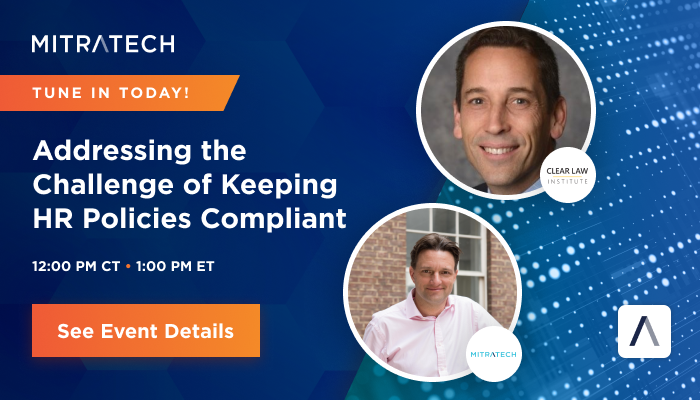Addressing the Challenge of Keeping HR Policies Compliant [Webinar Recap]
Mitratech and Clear Law Institute sat down for an expert panel uncovering how today’s companies can stay one step ahead of shifting regulatory and HR policies.
Employers and HR & Compliance professionals from across industries tuned in for a live webinar with Mitratech and Clear Law Institute last month detailing recent changes to federal and state laws that could impact policies. On November 17th, Mitratech’s own Henry Umney, Managing Director of GRC Strategy, was joined by Michael Johnson, CEO of Clear Law Institute, for a conversation about maintaining compliance while progressing toward greater process efficiency. This blog will cover the major takeaways of their discussion, and you can also listen to the full recording here.
Keeping Your HR Policies Up to Date
The first thing to do when it comes to compliance, according to Clear Law Institute’s Michael Johnson, is to figure out where you actually have employees living and working. It’s a common misperception that you only have to comply with state law where you’re headquartered — the truth is: you have to comply with the law where all of your employees are located, and keep a pulse on all policy changes in those relevant areas. Michael breaks down the six steps to staying up-to-date on managing HR policies below:
- Identify all the required policies in the states where you have employees (Don’t forget about remote employees!)
- Draft policies, ensuring that the language of the policies is compliant
- Monitor the law in all states for legal changes
- Make the required changes to your policies as laws change
- Provide policies upon hire and ensure employee acknowledgment
- Require annual employee certification
“You can spend a significant amount of time drafting a policy only to have it change. That’s why it’s critical to set up a system to make sure that you’re monitoring policy changes in all states where you have employees. A best practice is to give a handbook to employees and have them acknowledge it on an annual basis.” – Michael Johnson, CEO of Clear Law Institute
Recent HR Policy Updates at the State and Federal Level
It’s a challenge for employers not only to keep policies up to date, but also to ensure that the policies, as drafted, include all of the required content, which can vary by state.
“Some states have very specific policy requirements. And if you end up in the middle of a lawsuit, the first thing they’re going to be looking to see is whether you have all of the content requirements and recommendations.” – Michael Johnson, CEO of Clear Law Institute
Some examples of HR policies required at the federal and state levels include:
- Sexual Harassment and EEO Policies (protected characteristics)
- Accommodations
- Wage and Hour (including overtime and meal & rest breaks)
For example, New York recently revealed a new workplace sexual harassment hotline for support and guidance — a shift that will require employers to update their policies to include that resource. Washington, DC, on the other hand, recently passed a policy update that impacts only tipped employees.
Another large topic of conversation is leave laws. Employers need to be aware of nuances in the required leave accommodations in each state, including details surrounding vacation or sick leave. For example, there are new bereavement laws in Illinois and Washington to cover cases of child loss and parental leave. Other cases to keep an eye on include:
- Family and medical leave and state-paid FMLA
- Vacation and sick leave
- Voting and election official leave
- Domestic violence leave
- Crime victim and witness duty leave
- Jury duty leave
- Parental leave
- Organ, bone marrow, and blood donor leave
- School activities leave
- Military leave
- Volunteer civil service and emergency responder leave
Technology to Drive Efficiency and Compliance in HR Processes
So, how do today’s organizations oversee and manage their policy updates? According to our live webinar survey:
- 60% of attendees are still using manual processes
- 15% have implemented automation
The number of companies leveraging technology to manage policy updates is expected to increase — especially in the face of remote and hybrid work.
As Michael and Henry explain, getting information to the right people in a timely manner is only half the battle. The other half is ensuring that you can test an employee’s understanding of policy change and maintain a comprehensive, accessible trail of your policy information. Technology can help by making it possible to centralize all company policies and HR information, store all your policies, and communicate your policies at scale across the organization for instant attestation.
Some main advantages of leveraging technology to do so include:
- Mitigating operational risk — reduce the number and cost of regulatory noncompliance incidents
- Enhancing business resilience — add agility, flexibility, and precision to policy management
- Reducing Costs — increased visibility will lead to more proactive disclosures of policy violations, enabling you to triage and respond to those incidents quickly to reduce the cost of noncompliance while protecting brand reputation and revenue
- Increase Efficiency — remove manual review, approval, and attestation around policies and documents throughout their lifecycle
HR Policy Management — from Beginning to End — with PolicyHub & Clear Law Institute
Ensuring that HR policies are up to date and your employee handbook is current and compliant presents a significant challenge for many organizations.
To help, Clear Law Institute and Mitratech’s PolicyHub have partnered to provide a service that simplifies the considerable complexities of managing and communicating HR policies and procedures. Through our partnership, Clear Law Institute and Mitratech will provide a one-stop service where HR and Compliance professionals can outsource all their policy and handbook processes – from creation to delivery.
Are you a current customer of Mitratech and would like to learn more about our partnership with Clear Law? Reach out to your dedicated account manager, or contact us here.
Interested in becoming part of the Mitratech family and learning how PolicyHub and Clear Law can support your HR processes? Book a demo with an expert here.
![Addressing the Challenge of Keeping HR Policies Compliant [Webinar Recap]](https://mitratech.com/wp-content/uploads/LP-Banner-ClearLaw-Addressing-the-Challenges-of-Keeping-HR-Policies-Compliant-700x450.png)



